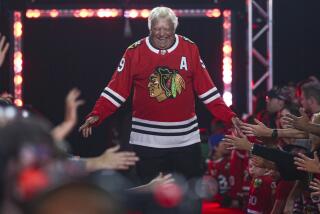Stanley Cup FINALS : There Were 11 Cups in This Pocket : Canadiens: Henri Richard and his brother were two symbols of Montreal’s dominance.
- Share via
MONTREAL — Luc Robitaille was 9 years old when Henri Richard retired, too young to remember the playmaking feats of the “Pocket Rocket.”
But by playing on 11 Cup-winning Canadien teams, more than any player in NHL history, Richard was woven into the legends Robitaille devoured as a child in Montreal. The mere sight of Richard and other Canadien greats at the Kings’ game-day skate Tuesday inspired Robitaille to a two-goal performance in the Kings’ 4-1 victory, and the thought of Richard owning more Cup rings than he has fingers left Robitaille awe-struck.
“I was looking at him and I know that he won 11 Stanley Cups,” Robitaille said. “I said to myself, ‘I don’t know what I’m going to do tonight, but I’ll work hard because I would never want these guys to say, “This guy can’t play,” or “He’s not working hard.” ’
“You’re not a champion until you won a Stanley Cup. He’s got 11 Stanley Cups, and I don’t think anyone is ever going to do that again.”
Because of the entry draft, invented at least in part to prevent Montreal from monopolizing the local junior talent, and the advent of free agency, no team is likely to match the dominance enjoyed by the Canadiens in the 1950s.
Led by Maurice (Rocket) Richard--Henri’s older brother by 15 years--goaltender Jacques Plante, winger Dickie Moore and the prolific Bernard Geoffrion, the Canadiens won an unprecedented five consecutive Cups from 1956-60, a feat that hasn’t been matched.
The New York Islanders came close, winning four consecutive Cups from 1980-83, and the Edmonton Oilers won five times in seven years from 1984-90, but no one has approached Richard’s distinction. Two men have played for 10 Cup winners: Jean Beliveau, who was Richard’s contemporary, and Yvan Cournoyer, a member of the next Canadien championship generation.
“I admit that I was lucky to play on talented teams that won 11 Stanley Cups,” Richard told La Presse, a French newspaper in Montreal. “To win the Cup five years in a row in your first five seasons is enough for a player in 20 years. I know that the success of the Canadiens in the five conquests were the feat of stars like Plante, (Doug) Harvey, Beliveau, Geoffrion, my brother Maurice, Moore and others who were together in the same era.”
The Richard brothers, Red Kelly and Beliveau share the record of 12 appearances in the Stanley Cup finals. Henri, a contrast to his burly brother at 5 feet 7 and 160 pounds, also shares with Kelly the record of most games played in the finals (65).
“Strangely, I don’t remember my first Stanley Cup very well,” said Henri, who was a 20-year-old rookie in 1956. “I never thought I would wear the uniform of the Canadiens at the same time as my brother Maurice. Imagine: I was 6 years old when Maurice made his debut with the Canadiens, and I played five years with him.”
His most memorable victory was in 1971, after his much-publicized spat with Coach Al MacNeil over MacNeil’s decision to keep him on the bench for an entire game of the finals against Chicago.
Richard proclaimed that MacNeil couldn’t coach, a statement that turned into an English-French feud. Richard came back to score the Cup-winning goal, but MacNeil resigned after the season.
After his initial fury, Richard forgave MacNeil. “Perhaps he was right,” Richard said, “and perhaps without that motivation he gave me, I wouldn’t have had the success I did in the seventh game against Chicago.”
Richard retired in 1975, after 20 seasons. Although not the dynamic player his brother was, Henri ranks among the NHL’s career leaders with 358 goals, 688 assists and 1,046 points. He operates a restaurant in Montreal and recently has been representing the NHL in ceremonies marking the 100th anniversary of the Stanley Cup.
“I am always interested in hockey and I am always a big fan of the Canadiens,” he said, “but hockey has changed. Equipment, everything. . . . To my eyes, the game has too much hooking, holding and cross-checking.”
More to Read
Go beyond the scoreboard
Get the latest on L.A.'s teams in the daily Sports Report newsletter.
You may occasionally receive promotional content from the Los Angeles Times.







